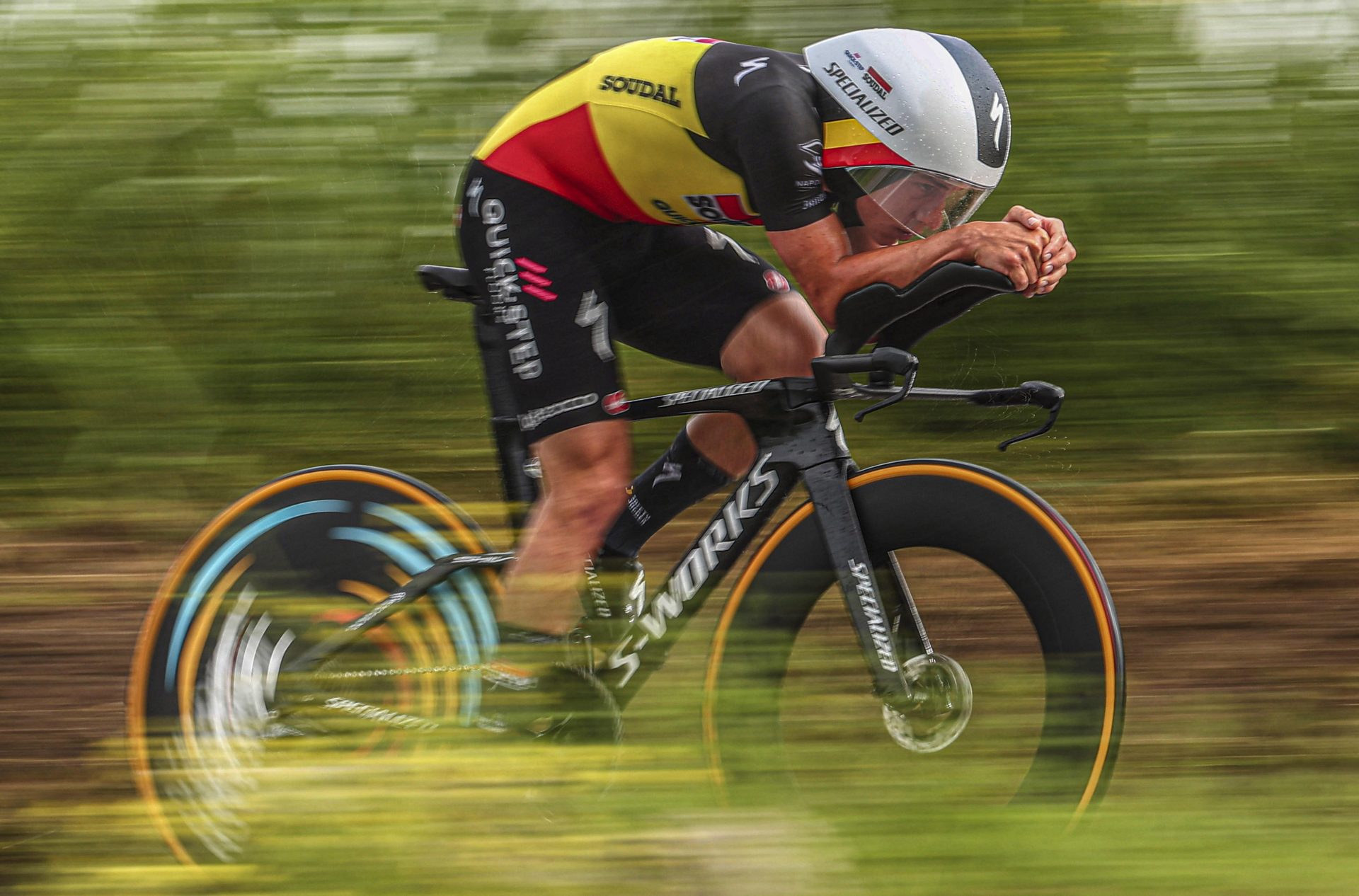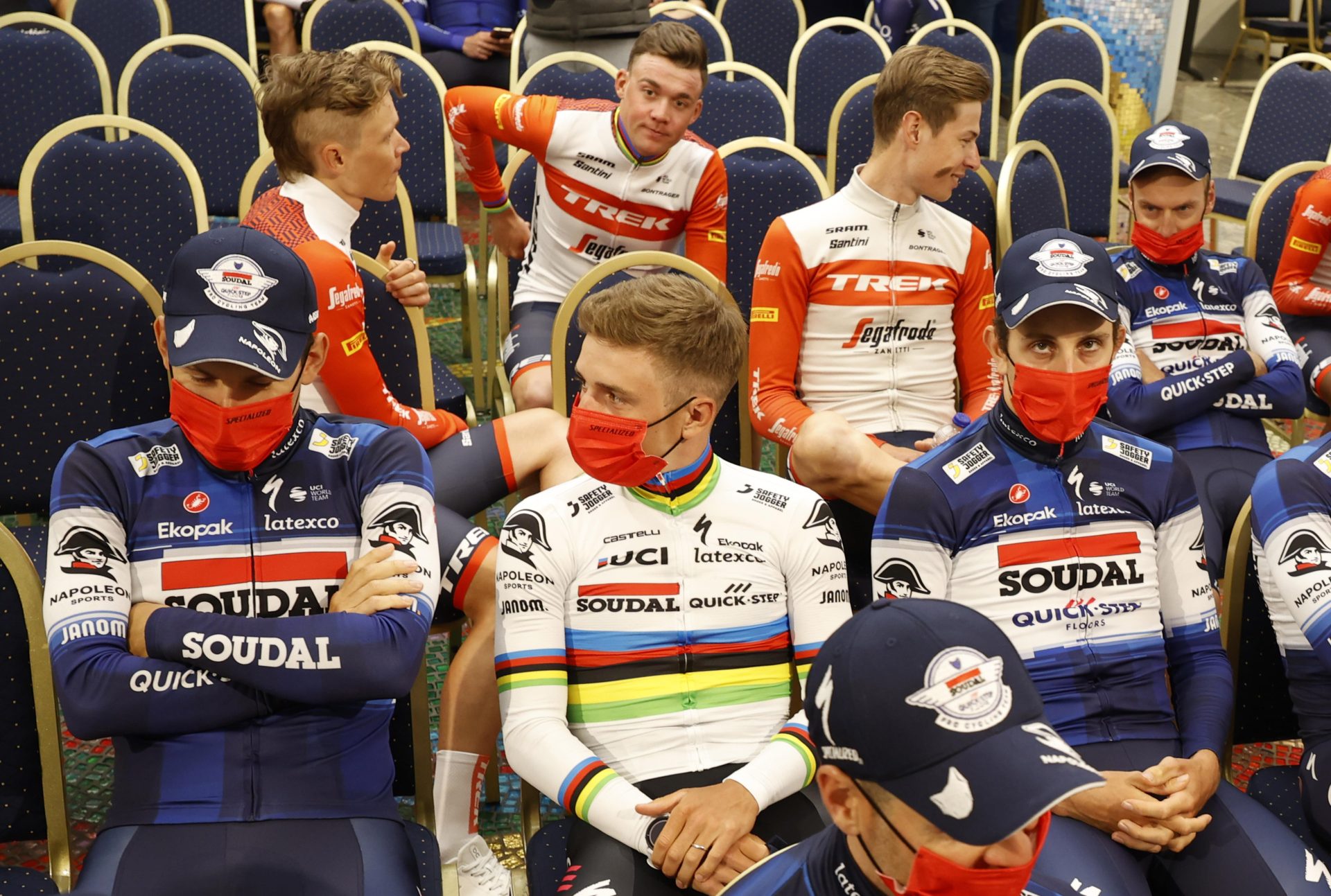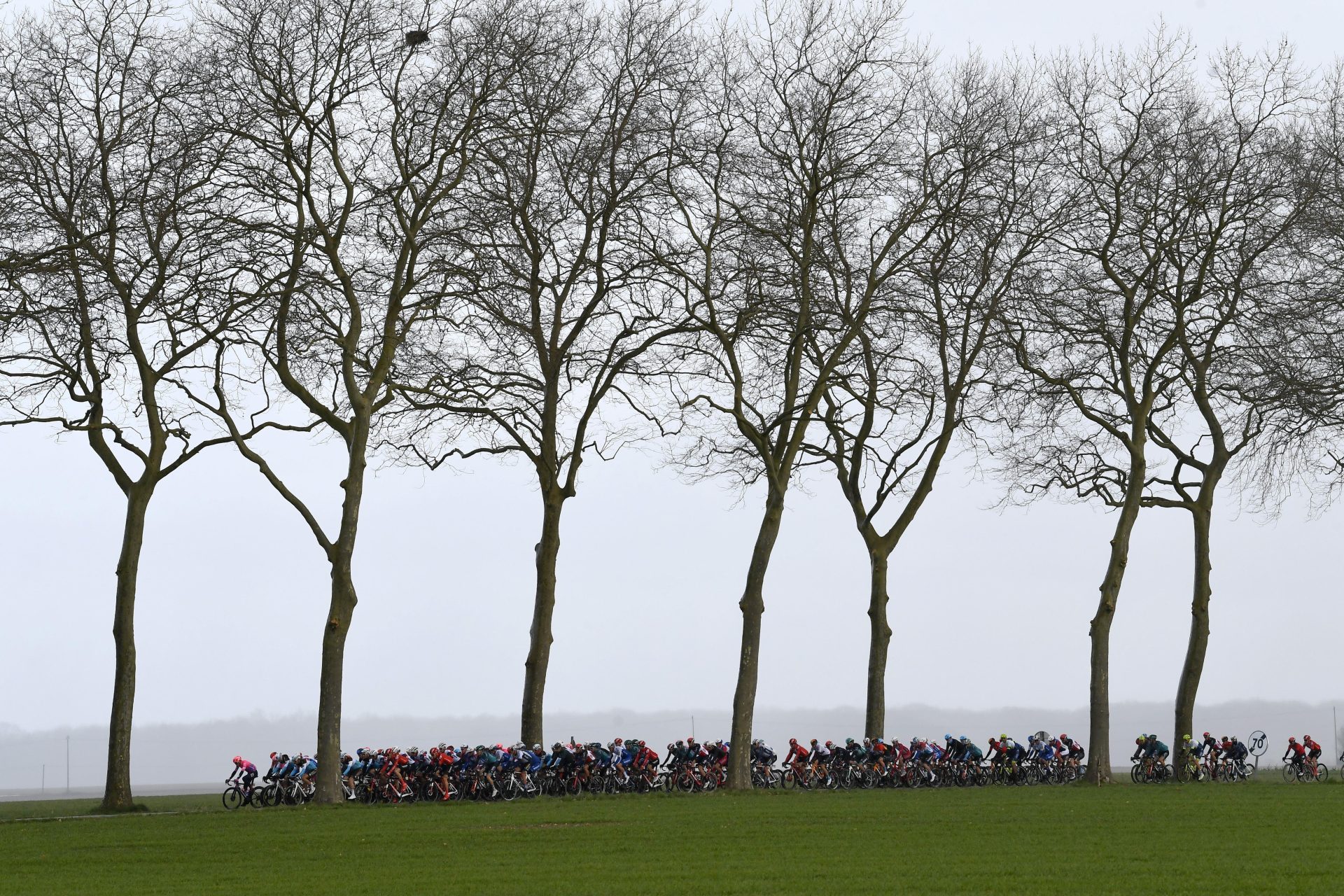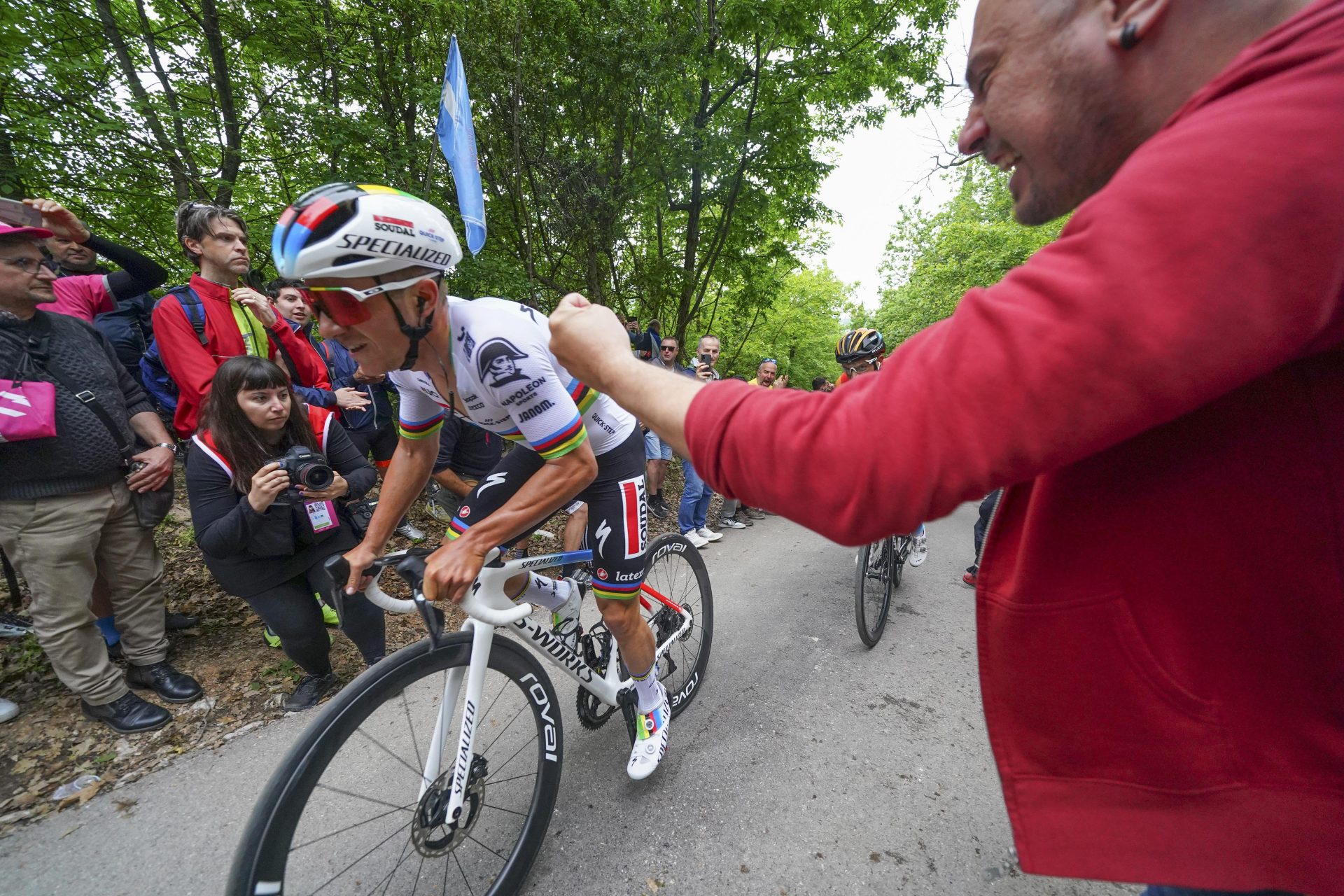The abrupt departure of Remco Evenepoel from the Giro d’Italia appears to have broken the cycling internet’s brain.
That’s honestly the only thing that explains the bizarro-world reaction to the stunning news that Evenepoel, the race leader, was out last Sunday night after testing positive for COVID-19.
I understand it was a shock, coming mere hours after his second stage win and robs us of one of the race’s main protagonists and a compelling storyline: could he hold a lead with such a small cushion?
And I appreciate that many had slight stakes in the matter. Sunday afternoon I had a premonition of sorts: a million fantasy Giro teams crying out in terror and then suddenly silenced. I empathize; my VeloGames roster – and that of most of my minileague – is a wreck, my chances now down to João Almeida and whether the EF duo of Magnus Cort and Ben Healy can rustle up another stage win or two.
But none of that explains, much less excuses, the reaction from some quarters. There, Evenepoel’s DNF was not the rational choice of a rider and his medical team. It was an offense, a disrespect to the race. In a column on May 16, longtime Gazzetta dello Sport editor Pier Bergonzi wrote that Evenepoel had a responsibility to try to stay in the race. “A great champion builds his legend by how he faces difficult moments,” he began.
“Everything related to health deserves the utmost respect and we don’t want to speculate,” Bergonzi continued, before doing just that: Evenepoel quit, wrote Bergonzi, “because he realized he was no longer in mental and especially physical condition to win.”

Not to be outdone, former pro Martin Hvastija, now director of the Slovenian national team, baldly laid out his own flat earth-grade conspiracy theory. “I think it’s more that Remco is afraid to face the truth than that it is a serious illness,” he said in comments on the SOS-echoes podcast. “I think that the main reason is that he does not have a three-minute advantage, as he predicted.”
Some of this Unfortunate Discourse seems to be Remco-specific. Hvastija also groused that Evenepoel is overrated and hasn’t accomplished nearly as much at this point in his career as Tadej Pogačar. (Granted, but is that the bar for overrated? In the sport’s so-called “modern era” the only rider with such jaw-dropping early career results was Eddy Merckx, but Evenepoel’s Vuelta España win, World Championship, and two straight victories at Liège-Bastogne-Liège aren’t exactly beanbag).
But it’s not only about Remco. It’s about COVID, which has a curious side effect of turning ordinary folks into medical experts about other people’s health choices. In Gazzetta, Bergonzi sniffed that the teams with riders who’d pulled out after positive tests, like Filippo Ganna, were using it as an excuse. “Corona is no longer an umbrella to hide under,” he admonished.
Even normally rational commentators wondered why Evenepoel would have immediately dropped out after a single positive test. It was a rest day, the thinking went. Why not wait, take a second test, and hope for a negative result to allow him to stay in the race?
That analysis in particular rests on an outmoded assumption: that Evenepoel needed a negative test to keep racing. But Intermarché’s Sven Erik Bystrøm also tested positive, and didn’t leave the race until he became symptomatic. That’s because all the old rules about COVID-19 that the UCI put in place at the height of the pandemic, which required negative tests to stay in the race, have been replaced by new guidelines. In fact, there’s no mandatory testing at all; it’s up to individual teams now. If they want to, they can simply not test, not mask, pretend the virus is a figment of Hvastija’s fevered imagination, and just race on unconcerned.
That’s what Bergonzi, at least, seems to want. “At a time when corona has been relegated to a simple flu, cycling is the only sport still looking for it,” he complained. “Not a single football match is stopped anymore, zero cases in tennis … [but] the Giro is now even reconsidering a new corona protocol, with masks that we thought were a thing of the past.”

Bergonzi is right that the world has largely moved on from the pandemic. The World Health Organization and most national public health authorities have ended the emergency phase. Masks are scarce. And we’re not collecting nearly as much data on the virus now, which of course makes it a bit tougher to spot outbreaks when they do occur at, say, a major sporting event. And when it does, it seems to produce the oddest, meanest responses in some people.
The rapid onset of the COVID-19 pandemic was, arguably, the first real-time, universally shared traumatic event in human history. Past pandemics unfolded at slower speeds, and while World War II was aptly named, even that conflict saw (small) parts of the globe untouched entirely. SARS-CoV2, by contrast, swept around the world with astonishing speed, and even those places initially spared by the virus itself were still immediately affected by its social and economic consequences. That’s a lot to process, and the disease’s return to bike racing evidently shows that we haven’t come even close to doing that in a positive, productive way.
I’m sorry about that. I’m sorry that governments and health officials badly fumbled the pandemic: slow to accept the virus was airborne, prone to shambolic public messaging, and of course the shameful scrabbling for vaccines that shut out much of the developing world.
Ultimately the main message that really got through was basically “you’re on your own,” and if you’ve noticed that people these days often seem more selfish, bitter, and quicker to anger in even ordinary circumstances, I think that’s partly related to how, as a society, we mis-handled a prosocial response to a generational crisis.
The thing about trauma is that it affects everyone differently. One quasi-protective response is, in effect, to reject it; the anti-vax and anti-mask movements are manifestations of that. The problem with refusing to deal with trauma, as any therapist can tell you, is that it doesn’t go away on its own. COVID’s return seems to have struck a nerve because it’s a reminder that the virus can’t simply be wished away. And the response to Evenepoel’s DNF, especially exemplified by Bergonzi and Hvastija’s meltdowns, shows that a lot of us are still learning all the wrong lessons.

I think that’s true because of the outsize response to COVID-forced DNFs compared to other causes. Stefan Küng also left the Giro on the first rest day, a planned departure intended to let him recover and refocus on other goals for the season. I don’t recall any outrage about his lack of respect for the race.
And we don’t second-guess other medical issues. Bergonzi finished his piece noting some famous health-related DNFs in cycling history, like Bernard Hinault leaving the 1980 Tour de France while in yellow due to a knee injury. “They left the race due to physical problems,” he wrote, as if respiratory disease was merely a mental block to be overcome with a bit of grinta.
That’s a ridiculous double standard. No one speculates whether Tao Geoghegan Hart really broke a hip on stage 11. No one says boo when a rider has a stomach bug and is dropped early and has to get in the team car, even though that ailment is no more visible than COVID, or simply rides himself into the ground with fatigue and wakes up one day to find that he can’t start, much as he wants to.
Because they do want to keep racing. Every day, in every race, riders die a thousand competitive deaths borne on a million doubts and race on. They race through bad weather, through crashes and injuries and, yes, illness sometimes, in the hopes that the next climb, the next stage, they might start to feel a better.
The idea that Evenepoel knew he couldn’t win so he took his bike and went home is so alien to the fiercely competitive mindset of a pro cyclist that it makes me wonder how Hvastija himself managed his own career without it. Unless, of course, he doesn’t actually believe that, and is simply talking shit on a podcast.

Could Remco have continued, could he not, is a useless question. Not because it’s unanswerable (although it is) but because none of us has the right to ask it of him, especially in context of what we know about COVID-19.
Evenepoel is 23 years old, at the glittering start of a possibly golden career, with the security of a long-term contract through 2026. He tested positive for a virus that comes with at least a five percent chance (1 in 20 cases!) of long-term complications, including systemic cardiovascular damage. (Some studies put the prevalence significantly higher.) Is it, perhaps, just maybe possible that his health calculus is a deeply personal process, with motives based on both short- and long-term considerations that may differ from the those of Bystrøm, a 31-year-old support rider in a contract year, and neither of which is objectively right or wrong?
Neither rider is our plaything, much as we might want to think they exist solely for our entertainment; not whether they’re on our fantasy team or took a promoter’s start money. None of us has the right to demand, or even ask, they race while sick. The decision is theirs alone to make, for the reasons they choose, and with the counsel they select.
On Wednesday morning, Evenepoel’s Soudal Quick-Step team had another regrettable announcement: four more riders were positive, and would leave the race. The team is left with just three, and that number may reduce further in the days to come.
Maybe, just maybe, the team knew something that we didn’t. Maybe – and I know this is difficult whenever Patrick Lefevere is involved, but let’s try on just this one thing – we should trust them. Maybe instead of viewing riders as one-dimensional aerobic automata, we should see them as whole, sometimes-fallible people. They have complex emotions and motivations and make difficult choices based on imperfect information, because just like us, they’re doing their best. Unless those choices actively harm others, maybe we should respect them.
What did you think of this story?


